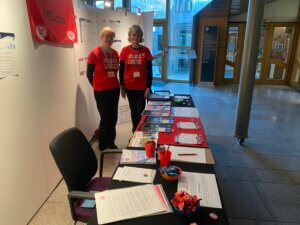Help the Solve ME/CFS Initiative Defeat ME/CFS
Transforming Data into Solutions
Ambitious and groundbreaking, the Defeat ME/CFS Research Plan begins with the creation of a comprehensive “big data” database of medical and scientific information. Using bioinformatics for systematic integration and analysis, the Solve ME/CFS Initiative aims to transform ME/CFS from a medically unexplained syndrome to a diagnosable and treatable disease.
Through active recruitment, we will expand our well established SolveCFS Biobank, engaging a community of thousands to participate in research and contribute their disease experience information and biological samples.
Working with the preeminent scientists and using proven technology, we will generate molecular data about how genes, viral exposure, immune response and other factors contribute to ME/CFS and its subtypes.
The SolveCFS Information Commons will collect, integrate and analyze experiential and health information from patients along with their molecular data to define ME/CFS and its subtypes.
Plan Outcomes
- DEFINE DISEASE SUBTYPES providing patients with deeper insights into their own experience and effective targeted treatments.
- Establish commonly accepted UNDERSTANDING among medical professionals, researchers and the greater public of the LEGITIMACY of ME/CFS.
- Create an enduring INFORMATION COMMONS, a knowledge network and ongoing tool for qualified researchers with an interest in contributing to the ME/CFS field.
- Develop committed partnerships with patients and pharmaceutical companies for clinical trials for DIAGNOSTIC and DRUG DEVELOPMENT.
- Create infrastructure to drive objective DIAGNOSIS and TARGETED TREATMENTS as part of the FDA approval process.
Hope for a Brighter Future
As all patients with ME/CFS know, this is an extremely complex disease that is poorly understood by medical science. To date, much of the research conducted has been small scale and targeted to singular aspects of the disease. Defeat ME/CFS is a comprehensive plan to master the complexity of ME/CFS and render meaningful results, bringing us closer to a cure.
There is no doubt this research is necessary. It is also clear that this important undertaking is an expensive proposition. Unfortunately, unlike most other serious illnesses, ME/CFS does not yet receive substantial research funding from our federal government. Until that changes, we must rely on the continued generous support of patients, family members and friends. When you support the Solve ME/CFS Initiative, you stand united with thousands of like-minded people who understand the devastation of this disease.
*Donations are tax-deductible in the United States.






1 thought on “Fund the SMCI Defeat ME/CFS Research Plan”
I have been diagnosed with CFS and would be happy to share my personal disease experience information. Supplying biological samples would be problematic as I live in Australia.
Comments are closed.